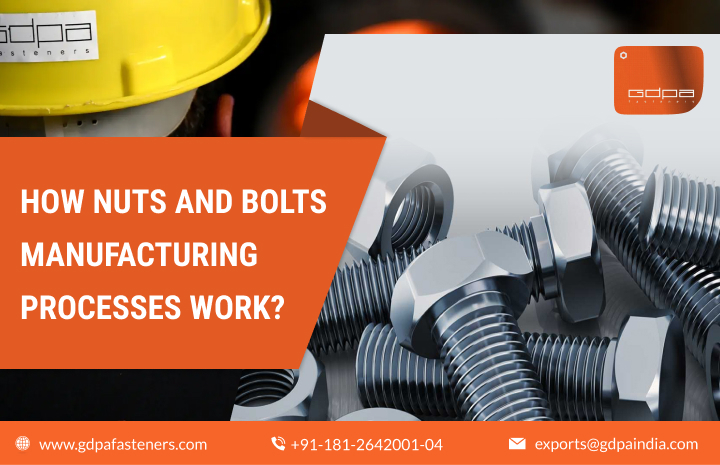
Have you ever thought about how many processes are used to manufacture bolts and nuts? Well, to manufacture fasteners, manufacturers use several processes that will be mentioned in this blog. If you work in the workshop, then you will be aware of the different uses of fasteners, if you are a beginner, then you can take help from this blog, as we’ll discuss their uses and many other things about fasteners. Let’s get started:
What are Nuts and Bolts Used for?
Bolts and nuts are used to attach two or more objects together. Bolts come into the category of threaded fasteners and are paired with nuts of threaded patterns. Bolts have a variety of sizes and shapes, and they can be classified by their characteristics, such as materials, finishes, strengths, and head shapes. These classifications are important to help individuals to choose the right set of bolts for certain applications.
Nuts are small metal objects that have a small hole in the centre. These curved patterns are known as threads. Nuts and bolts are incomplete without each other. So, it is necessary to use both to attach two objects. The following are some nuts and bolts uses:
- Joining materials or objects together
- Building and construction
- Hanging something on the wall
- Furniture manufacturing
- Cabinets installation
Nuts and Bolts Meaning
Nuts and bolts are kinds of fasteners, and these tools are used to join objects or materials together without harming them. There are various types of these fasteners, and you can choose them as per your requirements.
Types of Bolts and Nuts
Types of bolts: carriage bolts, hex bolts, U-bolts, lag bolts, flange bolts, square head bolts, plow bolts, etc.
Types of nuts: coupling nuts, lock nuts, hex nuts, square nuts, wheel nuts, slotted nuts, etc.
How are Nuts and Bolts Manufactured?
Fasteners such as screws, clips, bolts, nuts, and other fasteners undergo a variety of processes. Cold forging, machining, and hot forging are three common methods to manufacture fasteners. Manufacturing companies use different types of nuts and bolts manufacturing processes. The technique used to make a fastener depends on the quality, metal, and volume. Some metals are more flexible, and metal type has a significant effect on the forming procedure.
-
Cold Forging
Cold forging is also called cold roll forming, and it is the most prevalent nuts and bolts manufacturing process due to its speed and low waste. This process is quite the same as machining as it is done at or near room temperature to manufacture large quantities of fasteners affordably, efficiently, quickly, and consistently.
-
Machining
With the help of machining, metals are deformed to make components and parts. The metal piece can be bent to get the desired pattern by drilling, cutting, grinding, milling, and turning. Machining is done with metal at room temperature, or it can be slightly higher. Superior tolerances, precision, and the capacity to manufacture complex shapes are benefits of machining. If small batches of fasteners need to be manufactured, machining is the best method.
-
Hot Forging
When cold forging or machining is not done, then the nuts and bolts manufacturing companies use the hot forging method. As the name suggests, hot forging uses the method of heating the object. The object or material is heated, and it can be at 1200 degree Celsius during the heating process. The metal’s deformed shape is maintained when it cools because of the high temperature at which it is heated.
Raw Material for Nut Bolt Manufacturing
Take a look at the following points to know what raw material is used to manufacture fasteners:
- Carbon steel
- Brass
- Hexagonal rod
- Aluminum alloy
- Nickel alloy
- Stainless steel
- Polishing material
Common Nuts and Bolts Manufacturing Machines Used
- Thread rolling machine
- A dyer machine
- A wire pointing machine
- Cold forging machine
- A head trimming machine
- A steel polishing machine
- Cooler
- Boiler
- A bull block wire drawing machine
Fasteners create a non-permanent joint, which means if you use fasteners to attach objects, then you can remove them without causing harm to the object, but it doesn’t mean that you use them when you need to disassemble something. Fasteners can keep items secured that are liable to a lot of stress. It simply means fasteners are used for both permanent and non-permanent joints.
Summing Up
Bolts and nuts are made of various materials, so make sure to choose the one that matches your requirements. You should use high-quality fasteners if they have to experience high pressure of objects, otherwise, you can use fasteners made of other material that can bear low and medium pressure. The most important thing that you need to keep in your mind is that make sure to buy fasteners from a well-reputed company.